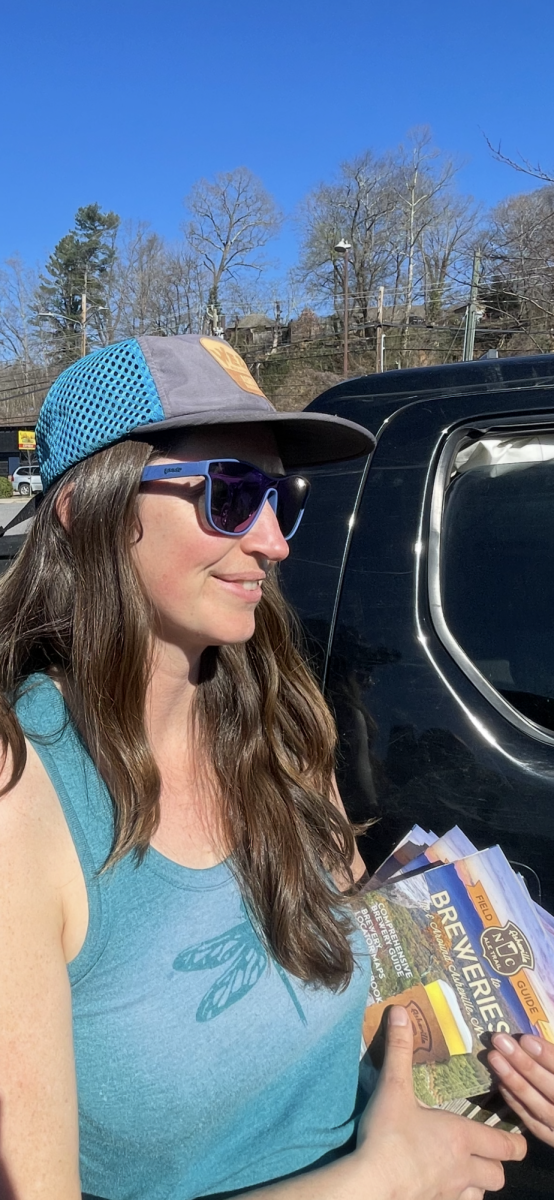Katie Eastridge can’t quite remember when she last slept through a storm without bracing for impact. These days, when the rain drums against the roof of her tiny house cabin, her mind drifts to the night the flood came. The night she became an accidental survival guide.
She and her husband, Eric, own GreenFlash Watersports, a company specializing in leisurely river and beer-tasting excursions down the French Broad. This is the kind of business that sells an experience: one where tourists soak in the Asheville sun, a beer in hand, and let the slow-moving current carry them toward the next brewery. But when Tropical Storm Helene tore through western North Carolina, flooding entire towns and sweeping away homes, Katie navigated an entirely different kind of river tour.
* * *
A river that took more than it gave
It started with the boat.
“We didn’t think it was going to be that bad,” Katie admits. “Our biggest concern was getting the ski boat out of Lake James before the water rose too high.”
Eric left their home near Bat Cave to check on it, planning to return by nightfall. But the storm had other plans.
By morning, their house was filled with water.
“I came back inside, and there were already four feet of water in the living room,” she says, shaking her head. “We just started grabbing everything we could — throwing it upstairs, praying the loft wouldn’t flood.”
They had no idea where Eric was.
“We didn’t hear from him for two days,” Katie’s eyes soften just enough to reveal vulnerability. “The towers were down. Roads were gone. The only thing we knew was that he was out there somewhere, trying to get back.”
What they didn’t know was Eric was on a brutal trek home.
“He tried every road,” Katie said, tears swelling. “But there were trees down, landslides everywhere. At one point, he had to leave the truck five miles from home because it was stuck behind a landslide. He climbed over fallen trees and rockslides to get back to us.”
Katie still remembers the moment he appeared.
“I was out by the river,” she recalls, hope glimmering in her eyes. “Someone said, ‘Is that Eric?’ And there he was, climbing over the last landslide. He left the truck, hiked through the debris,, and ran toward us.”
Relief washed over her, but it was fleeting. The floodwaters were still rising.
The flood took nearly everything. It severely damaged their home, business equipment, and even their fleet of kayaks stored in a storage unit in Asheville. But somehow, miraculously, the only boards left at home were the ones with holes in them—the ones she had planned to patch up.
And those, it turned out, were enough.
* * *
An accidental rescue mission
When the floodwaters didn’t recede, Katie grabbed one of the damaged paddleboards and paddled across the river to check on neighbors.
“I heard there was a horse farm that still had satellite Wi-Fi,” she says. “So I loaded up messages from neighbors, people just wanting their families to know they were alive and paddled over.”
On the way, she met a man with a backpack and a walking stick who was hiking toward what he thought was an open road.
“I had to tell him there was no bridge,” she says. “Nowhere to go.”
So she did only what she could do: ferried him across.
And then she kept going.
While roads remained impassable for two weeks, Katie’s paddleboard became the town’s unofficial ferry. She transported elderly residents, small children, and even a few bewildered dogs across the floodwaters. She brought in generators, food, and whatever else she could carry.
It wasn’t the kind of business she and Eric had planned to run, but it was the only one that mattered in those days.
* * *
The cost of starting over
When the water finally retreated, the damage was impossible to ignore.
“I’d say we lost about $30,000 in equipment alone,” Katie estimates. “But then you add in the lost revenue, October’s usually our busiest month for tourism. That hit hard.”
For a while, they weren’t sure if GreenFlash Watersports would recover at all.
But Asheville rallied.
“There have been so many organizations stepping in to help,” she says, naming groups like the Dogwood Health Foundation and the Outdoor Gear Builders. “I think people realize how much these small businesses shape the city.”
A local arts foundation, Lake Eden Retreat, offered Katie and her family a place to stay while they rebuilt their home.
“I can’t explain what that meant to us,” she says. “Being surrounded by music, art, and people who just want to help, it was exactly what we needed.”
With the party bus up and running again, Katie is looking toward the future.
“Our summer season depends on what the river looks like,” she says. “We’re hoping to replace our kayaks soon, and get back to doing brewery floats.”
Maybe, just maybe, she’ll be able to sleep through the next storm.
If the water rises again, she knows exactly where she’ll be, on a paddleboard, bringing people home.


![Brooke Pedersen [second from the right] and Luis Reyes [right] hold banners during the Wrap The Woods event.](https://thebluebanner.net/wp-content/uploads/2025/09/ELIZABETH_PRITCHITT_IMG_3470-1200x804.jpg)

















